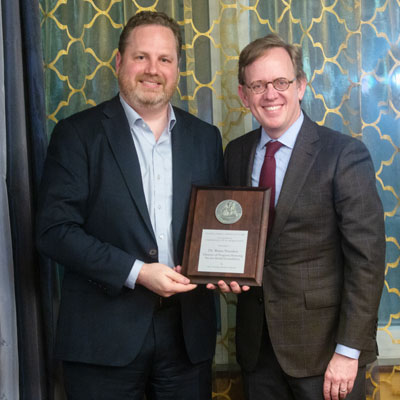SSP presents Director of Program Planning for Secure World Foundation Dr. Brian Weeden with Doolittle Award | 2023 | News

Dr. Brian Weeden, Director of Program Planning for Secure World Foundation, was awarded the General James Doolittle Award by MIT's Security Studies Program on Tuesday, April 25. He is pictured with MIT SSP Director M. Taylor Fravel.
Brian Weeden on Space and Air Power: Doolittle Dinner 2023
On April 25, 2023, the MIT Security Studies Program welcomed Dr. Brian Weeden as this year’s recipient of the General Jimmy Doolittle Award. Thanks to Pierre (MIT SB 1988) and Amy Chao’s generous support, SSP holds the annual Doolittle Dinner to recognize a person who has made significant contributions to the advancement of U.S. air power. In addition, the event reminds MIT graduate students and fellows of how science and technology can contribute to national security. Now the Director of Program Planning for Secure World Foundation, Dr. Weeden has dedicated his career to advancing the security and stability of space.
During his remarks, Dr. Weeden discussed his journey from an undergraduate student in Air Force ROTC to his position today with the Secure World Foundation. After graduating, his first active-duty position was as an ICBM launch officer in Montana. Dr. Weeden highlighted the difficulty of maintaining readiness as part of nuclear command and control, as the job vacillated between being “mind-numbing and boring” but with “extraordinary pressure to be perfect all the time.” At his next duty position in Cheyenne Mountain in Colorado, Dr. Weeden recalled “sitting in a mountain” as they worked to monitor all human space activities. With end users within and outside of the U.S. military, he sorted through tracking data to maintain an extensive catalog of space objects. After China’s 2007 anti-satellite (“ASAT”) test generated 3,000 pieces of trackable debris, Dr. Weeden recalled discussions of how to identify and respond to similar events if they were ever targeted against U.S. assets.
In his civilian career, Dr. Weeden joined the Secure World Foundation to focus on “space sustainability” with the goal of preserving space for use long into the future. This work entails common concerns like space debris and traffic management, but also space power—something the United States relies on heavily. Dr. Weeden reminded the SSP audience that although people sometimes claim “space was a sanctuary,” in reality “we’ve just forgotten about it.” The Chinese ASAT test reminded the United States that the space capabilities it relies on for its way of life—and war—are brittle against threats.
How is the United States managing this threat? Dr. Weeden admitted there are few success stories, at least in the unclassified domain. However, national policy has laid out consistent goals and there is bipartisan agreement on space. Dr. Weeden referred to the 2011 National Security Space Strategy as the foundation for efforts today, which described space as “congested, competitive, and contested.” He argued this strategy essentially “got it right” on deterrence, focusing on deterrence by denial to enhance the resilience of space assets.
Dr. Weeden concluded with a discussion of “disruptive innovation.” When a new product like the iPhone fills an unanticipated gap in the market, old companies like Blackberry cannot react quickly enough and die. As Professor Clayton Christenson has argued, big companies fail in the face of new upstarts because the existing organizations have established customers, products, and processes that makes it hard for them to change. As the Pentagon works to address the space threat, Dr. Weeden assessed that there is “good news, and also lots of work to be done.” On the bright side, “leadership gets the problem” and aims to rapidly change things like recruitment and talent retention. However, he emphasized the challenges to shifting to a resilient posture in space. Ultimately, the United States still faces the “innovator’s dilemma” when it comes to organizational change.
To read more about the award, please visit the Doolittle Award page. To learn more about Dr. Weeden, please visit his Secure World Foundation page.
